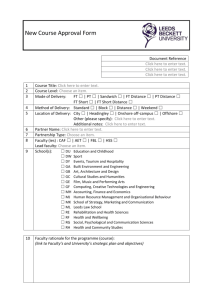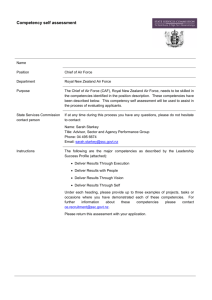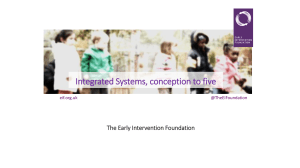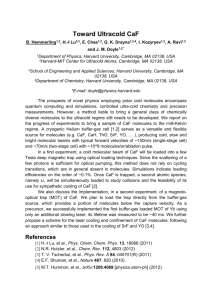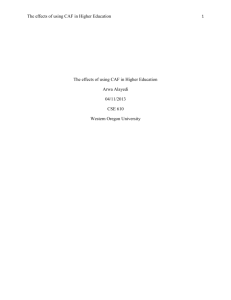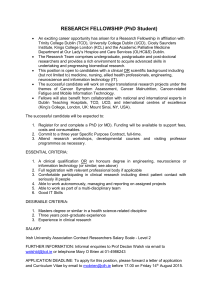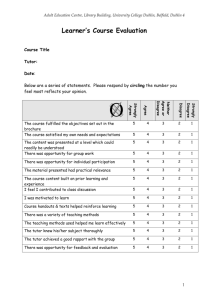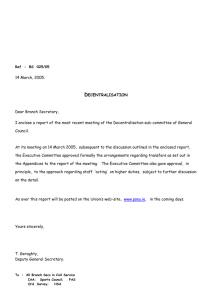Circular to Branches Dated 3rd August 2004
advertisement
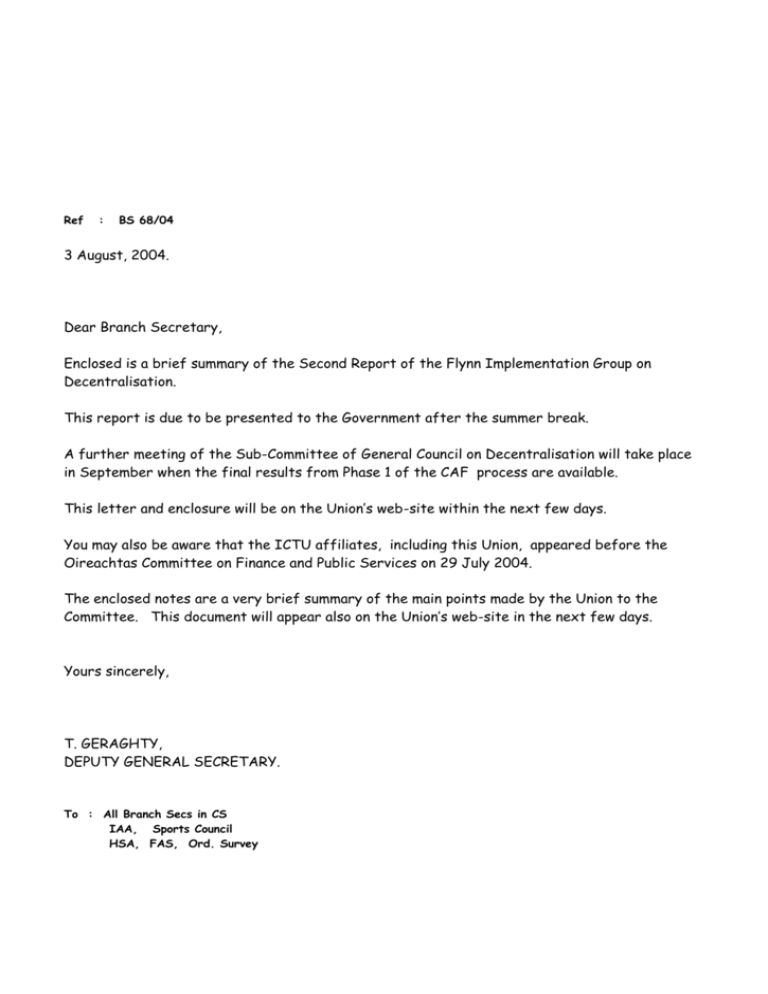
Ref : BS 68/04 3 August, 2004. Dear Branch Secretary, Enclosed is a brief summary of the Second Report of the Flynn Implementation Group on Decentralisation. This report is due to be presented to the Government after the summer break. A further meeting of the Sub-Committee of General Council on Decentralisation will take place in September when the final results from Phase 1 of the CAF process are available. This letter and enclosure will be on the Union’s web-site within the next few days. You may also be aware that the ICTU affiliates, including this Union, appeared before the Oireachtas Committee on Finance and Public Services on 29 July 2004. The enclosed notes are a very brief summary of the main points made by the Union to the Committee. This document will appear also on the Union’s web-site in the next few days. Yours sincerely, T. GERAGHTY, DEPUTY GENERAL SECRETARY. To : All Branch Secs in CS IAA, Sports Council HSA, FAS, Ord. Survey BRIEF SUMMARY OF THE POINTS MADE BY THE PSEU TO THE OIREACHTAS COMMITTEE ON FINANCE AND PUBLIC SERVICES REGARDING THE GOVERNMENT’S DECENTRALISATION PROGRAMME, ON 29 JULY 2004 1. The Union is not going to involve itself in a debate about the Decentralisation Programme that centres on the value to the regions on the one hand and the perceived impact on public administration on the other. 2. The Union’s sole concern is with the effect of these proposals on the people working in the relevant organisations 3. If the Union’s suggestion of a survey of staff, prior to specific announcements, had been taken up it would have been possible to identify how many staff were interested in re-locating and the locations that were of interest to them. This could have helped to avoid much of the current controversy. 4. Nothwithstanding the lack of pre-preparation the Union will deal with this issue as an Industrial Relations matter and will use the relevant negotiating machinery to seek to have members’ issues addressed. 5. In this regard the Union’s membership and their perspectives can be broken down into three categories : a) Close to 3,000 of the Union’s members are already located outside Dublin. This group has had poor career prospects to date and would, obviously, welcome the provision of opportunities due to the re-location of posts b) From the preliminary results of the CAF process, it seems likely that about 1,000 members in Dublin will indicate an interest in participating in the programme. For this group also the programme has a positive aspect c) For the remaining 5,000 or so members who live and work in Dublin and who intend to stay living and working in Dublin, the programme is seen as threatening and is the cause of a great deal of apprehension and fear 6. The Union, therefore, is willing to support the re-location of those members who wish to go and is willing to participate in the Industrial Relations processes in order to try and find solutions to any problems that arise. 7. However, there are two absolutes so far as this Union is concerned, as follows : a) the Union will resist, with every means at our disposal, any attempt to force people to re-locate b) the Union will not agree to a total shut-down in career opportunities for those members who choose to remain in Dublin. Indeed, the Union signalled earlier this year that any attempt to impose such a measure would move the Union to a position of outright opposition to the programme 8. For our members in 5 of the State agencies affected by the proposals, the issues are even more acute. Many of these staff chose to work for the particular agency because they are interested in, or have a specialist knowledge of, the area of work carried out by the Agency. Obvious examples are provided by the Sports Council where people employed there are interested in, and committed to, sports administration and have no wish to work for any other agency. This type of situation is replicated in other agencies. Given the low level of interest in these agencies, as evidenced by the preliminary CAF results, there seems to be little point in attempting to deal with the range of contractual and legal issues that interchangeability across separate employments will involve. 9. The Union, however, wants to make it clear that the problems experienced in getting staff from the Agencies to re-locate cannot be resoled by substituting further parts of the Civil Service, given that there are clear short-falls in applications for many proposed new Civil Service locations. 10. The lack of clarity surrounding the process is a cause for concern. Members need to know how they will be affected, where are they likely to end up working if they stay in Dublin, what job they will be doing, what effect will there be on their career prospects etc. It is an unsatisfactory situation that these questions cannot be answered and fears are, therefore, heightened. For some members who have additional earnings in the form of allowances etc, these fears are heightened considerably. 11. Interestingly, the preliminary results of the CAF process indicate high levels of interest among staff in re-locating to towns within commuting distance of their existing places of work. In reality, for many people this programme is an opportunity to change their commuting patterns rather than to re-locate their home and family. These people can and should be accommodated. 12. Finally, the Union will continue to deal with this issue as an IR matter. We will not involve ourselves in the politics of the issue and we are not interested in becoming embroiled in arguments about the value of the programme as an instrument of policy. Provided the employer adopts a reciprocal flexible position in discussions with us, we will participate in the IR processes in a positive fashion, subject to the two absolutes outlined already. 18\decent\oircttee – note of mtg DECENTRALISATION UP-DATE SECOND FLYNN REPORT ON NON-EVENT On 30 July 2004, the second report of the Flynn Implementation Group on Decentralisation was published. Despite the pre-publicity that suggested the Group would recommend that the time-scale for the implementation of the Government decision should be lengthened, the Report states that any recommendations regarding timing and sequencing should await the outcome of the CAF process in September. By and large, the document is a progress report on steps taken to date and contains very few specific recommendations. The following is a brief summary of some of the main points of interest to members of this Union : 1. The Group recommends the engagement of independent outside expertise to ascertain how those staff who are still prepared to consider their options, view the decision to move from Dublin and the key levers and barriers to their decision-making 2. The Group recommends that Civil Service Management and Unions should agree appropriate arrangements on promotion following the outcome of the CAF in September. It recommends also that the Department of Finance should ensure that the filling of normal course vacancies in recruitment level grades takes full account of the programme and that the Department should table proposals to the Unions in relation to ongoing regional recruitment, mobility and promotion policy in a post-decentralised Civil Service 3. In the context of the points at (2) above the Group suggests that there is little value in dealing with these issues by making interim arrangements and that both sides need to consider the outcome of the CAF in September 4. The Group recommends that staff in Health Boards and Local Authorities should be enabled to indicate whether they are interested in re-locating, through a separate process 5. The Group suggests that an overall framework for managing staff transfers needs to be developed. The Report re-states the commitment to the use of a CAF process to try and accommodate those staff staying in Dublin with their preferences for re-assignment. 6. The Group recommends a separate CAF process for the health sector jobs announced in July. 7. The Group recommends that information about ICT posts should be included in the CAF as soon as possible. The text of the Second Report of the Flynn Implementation Group on Decentralisation is available through the Department of Finance web site at the following address: http://www.finance.gov.ie/viewdoc.asp?DocID=2468&CatID=48&StartDate=1+January+2004&m=c 18\decent\Flynn report
